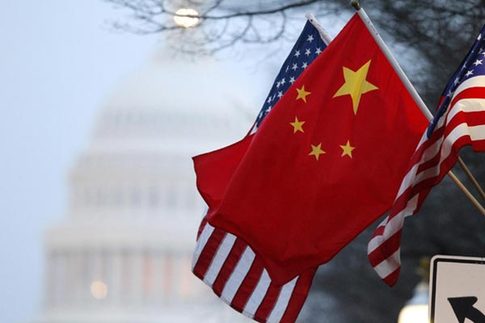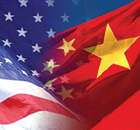Foreign and Military Affairs
China, US 'need co-op to solve trade imbalance'
(Xinhua)
Updated: 2011-01-20 18:01
 |
Large Medium Small |
|
 The People's Republic of China flag and the US Stars and Stripes fly along Pennsylvania Avenue near the US Capitol in Washington during Chinese President Hu Jintao's state visit, Jan 18, 2011. [Photo/Agencies] |
WASHINGTON - China is willing to work with the United States on the imbalance of bilateral trade through communication and cooperation, Chinese Commerce Minister Chen Deming said Wednesday.
Trade imbalance is indeed "an important issue that the two sides need to have a correct perception of," Chen said during Chinese President Hu Jintao's ongoing state visit to the United States.
Responding to a question that linked the trade imbalance with China's currency RMB, Chen said the two issues are irrelevant.
"According to Western economics theories, currency will have an impact on the overall export of a nation. But if it is just about trade surplus or deficit between two countries, then it is not a matter of currency. Rather, it is something about trade barriers, trade liberalization and trade facilitation, which both countries need to sit down and talk about," he said.
China's trade surplus totaled $183.1 billion in 2010, of which $181.3 billion was gained from the United States, meaning the Sino-US trade imbalance has nothing to do with the currency, as China barely had a surplus with other trading partners, Chen said.
He listed three major reasons for the huge surplus.
First, part of that surplus comes from the trade surplus originally held by other countries and regions against the United States. This is a result of the globalization process.
Second, the United States still holds trade discrimination against China.
"The United States bans military items export to China and also subjects military-civilian dual-use items to very rigorous restrictions," Chen said.
Currently China is the third largest export market for the United States, and China's imports from the country is expected to further grow as it continues to implement an import stimulus policy this year. However, China is excluded from the Obama administration's list of countries and regions to which US export control will be eased, he said.
"This is apparently not in the interests of American companies and workers," Chen said. "We hope the United States could change such policy and readdress the trade imbalance between the two countries."
Third, there were some misalignments in trade statistics that both sides are currently working together to reconcile.
"We believe we should discuss the trade issues in an atmosphere of mutual trust and equality. Only in this way can we find a better solution to the issue," he said.
The minister, currently accompanying Chinese President Hu Jintao on a four-day state visit to the United States, said multi-billion deals between the two countries will be signed during Hu's visit, including Chinese purchases of US products worth a total of $24.9 billion, which testifies to the importance of Sino-US trade relations.













